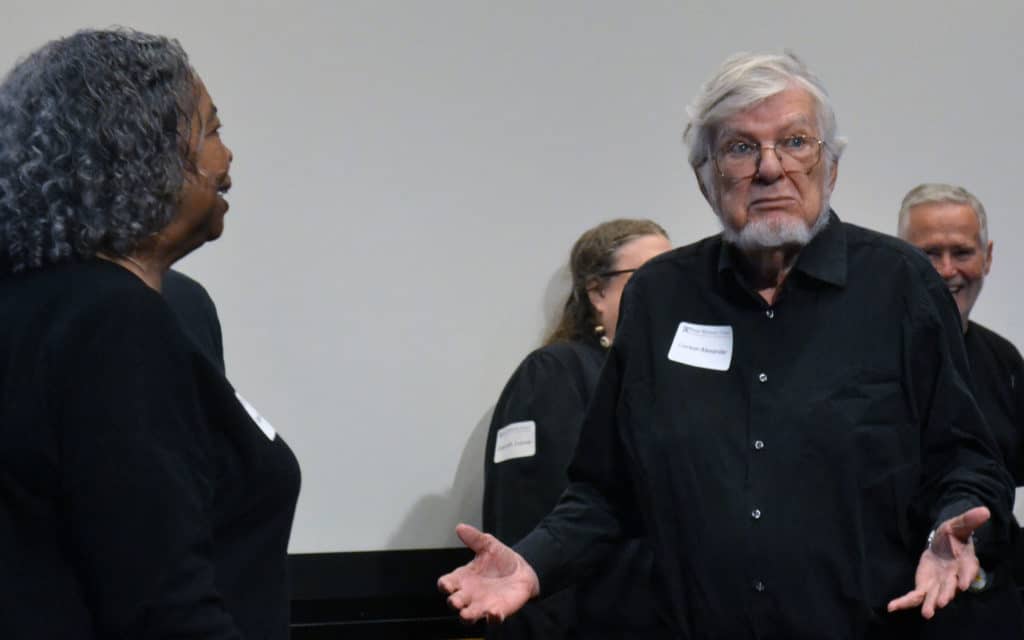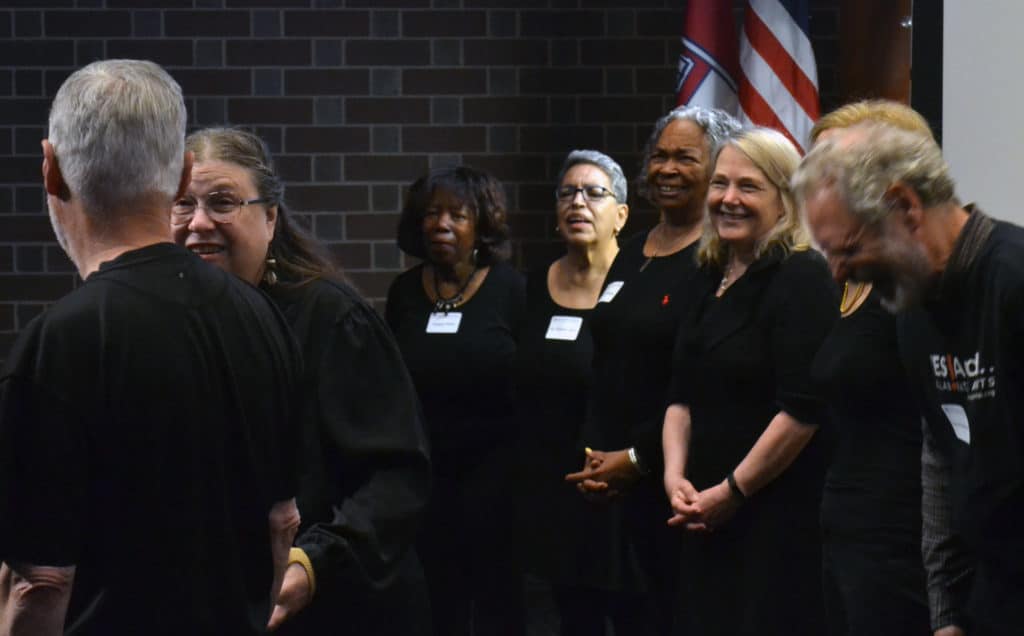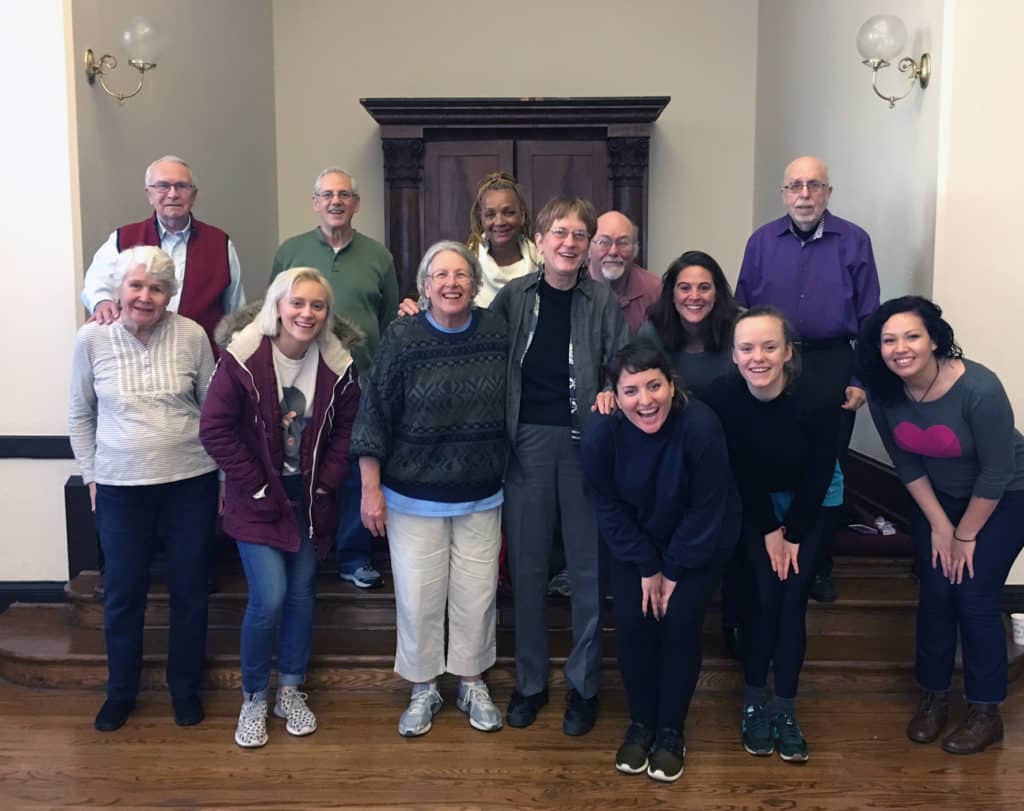
Cognitive Comedy, a free improv comedy workshop for people with cognitive impairment and their loved ones, is back at Penn Memory Center. The class will continue this year without Leah Lawler, who left to pursue graduate studies at New York University, and is now under the guidance of Jean Haskell, who has taught theatre and performance classes for Temple University’s Osher Lifelong Learning Institute (OLLI). Improv actors-to-be can let it all hang out at Cognitive Comedy sessions each at 4 p.m. every other Tuesday between March 24 and June 30 at Ralston House, Room 241, 3615 Chestnut Street. To register, email jean.haskell205@gmail.com.
By Kaleah McIlwain and Danny Yarnall
Papa John yells “zap” and shoots his hand towards Abby, charged with shouting “zop.” What comes out, however is a loud “zip.”
The error is met not with jeers but raucous applause.
Cheering when someone makes a mistake is Leah Lawler’s way of emphasizing that mistakes are acceptable in Cognitive Comedy, where more than a dozen participants came together and exercised memory muscles with various improv exercises. Lawler, a Philadelphia actor, started the weekly workshop with the Penn Memory Center (PMC) as a way to combine social engagement with learning a new skill and having fun.
“It provides a sense of community and belonging. It is fun and gets older adults out of the house with something stimulating and meaningful to do,” said Felicia Greenfield, PMC executive director. “They are engaged and they’re learning new skills.”
Lawler had contacted Greenfield with a suggestion to start an improv workshop for the center’s patients and community. What the group became, moreso, is a family of patients, loved ones, and caregivers who met on Saturdays and do more than just run through improv exercises. They call themselves “The Flounders,” a name with no real purpose or deeper meaning. As Lawler explains it, the group would be laughing about something on and on. Instead of repeating what was funny they would just yell “Flounder!”

The “Zip Zap Zop” improv exercise, which challenges participants’ memory skills, was how the Flounders warmed up for its last session before its finale performance at the PMC Research Partner Thank You Luncheon. At the Luncheon, the group performed a long-form exercise for the audience, which is when the Flounders are given a random word, and they proceed to enact two-person scenes based off the word.
The long-form improv method was adopted by Lawler, because this particular form of improv better helps participants exercise their memory skills when they work on longer pieces.
One of the many ways this eccentric group of people have bonded and turned the workshop into their second family is through getting lunch and spending time together outside of the workshops.
Tina Bak-Brevik, a caretaker who has been a part of the workshop for more than two years, moved to Philadelphia almost three years ago and wanted to find a support group like the one she had before she moved. She cannot remember how she found out about Cognitive Comedy, but she is glad she did.
“I don’t know who’s participating as a caretaker or as a patient,” said Bak-Brevik of the welcoming atmosphere the group offers.
Estelle Alexander agrees with Bak-Brevik. She has been accompanying her husband to the workshops and said what stands out the most is the “sense of love and support of the members and the positivity.”
Creating trust and familiarity was important for Lawler, who began the workshops with a mix of improv students she knew and older adults from PMC. But as time went on, she realized that the class was completely capable of understanding with just her there, and they have become closer for it.
In attending one of the workshops, it is plain to see just how close the group has become with each other. As the class filters in, Lawler brings breakfast and coffee for everyone and they all chat, joke, and laugh as they wait for all the members to arrive. Lawler then does a one-minute check-in with everyone in a circle where they talk about their weeks and catch up. Never a dull moment, the group is more likely than not always joking and laughing with one another earnestly.
Lawler, who was the instructor for the workshop from 2015 to 2019, was what her participants called a dynamic and encouraging individual, as stated by Bak-Brevik and Alexander, and they were thankful to have her.
The improv workshop has been running since its trial sessions in 2015. Both trial sessions were at capacity, and the group has grown over the past couple of years to now consist of over a dozen members carried out in eight-week “seasons.” Cognitive Comedy is one of the PMC’s special engagement programs and is open to all participants of the PMC community.

Jean Haskell, a retired organizational development consultant, will run the 2020 season of the comedy workshop. She has taken part of theatre groups and performances for years and has spent the last decade teaching theatre classes at Temple University’s Osher Lifelong Learning Institute (OLLI), where adults 50 and over can take classes in subjects ranging from World Economics to photography.
She found out about the opening after teaching a class at OLLI that Alexander had also been attending with her husband Greg and suggested Haskell take over for Leah this year.
Alexander is optimistic about Haskell’s ability to run the group in Leah’s absence, having seen her teaching style and techniques firsthand.
“[Jean] is very good at bringing those creative and spontaneous kind of responses out of of people. I can’t think of anyone better to lead that class,” she said.
Haskell could tell that her classes at OLLI had a positive impact on her students and she wants to maintain the Cognitive Comedy’s space as welcoming and joyous place, where her participants can feel competent.
“I’ve had people come up to me [in previous classes] and tell me this was this was the first time they’ve laughed all week,” Haskell said
Haskell aims to keep the same lively spirit to the sessions by creating fun exercises that require quick thinking and agility. In one activity, she has a student perform a monologue but every time a bell rings they have to change the last word of the sentence. The answers are often the first thing that comes to mind, which puts her students in bizarre scenarios where they are shopping for elephants in the grocery store or eating shoelaces for dinner.
She also loves watching her students find a sense of accomplishment in her activities and develop’ pride in their work, but also she has a front row seat to the bonds that are forged in the improv experience.
“[The classes] generate strong friendships because people just let it all hang out,” Haskell said.